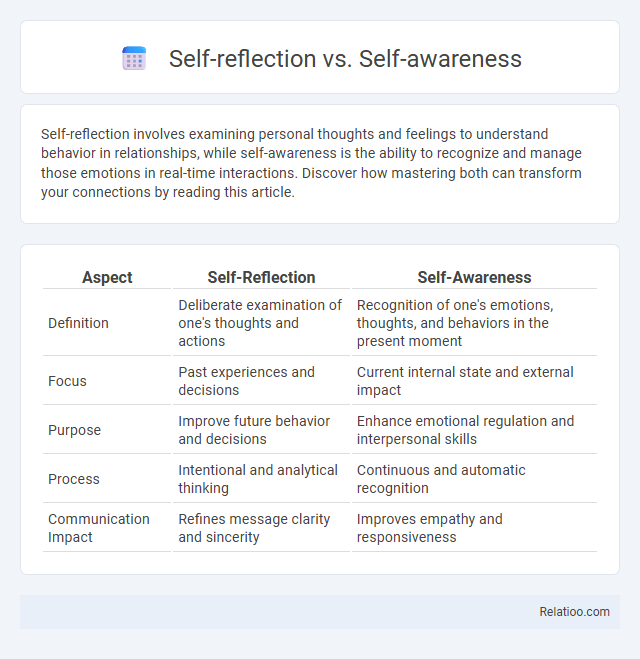Self-reflection involves examining personal thoughts and feelings to understand behavior in relationships, while self-awareness is the ability to recognize and manage those emotions in real-time interactions. Discover how mastering both can transform your connections by reading this article.
Table of Comparison
| Aspect | Self-Reflection | Self-Awareness |
|---|---|---|
| Definition | Deliberate examination of one's thoughts and actions | Recognition of one's emotions, thoughts, and behaviors in the present moment |
| Focus | Past experiences and decisions | Current internal state and external impact |
| Purpose | Improve future behavior and decisions | Enhance emotional regulation and interpersonal skills |
| Process | Intentional and analytical thinking | Continuous and automatic recognition |
| Communication Impact | Refines message clarity and sincerity | Improves empathy and responsiveness |
Understanding Self-Reflection: A Deep Dive
Understanding self-reflection involves actively examining Your thoughts, emotions, and actions to gain deeper insights into personal behaviors and motivations. Self-awareness refers to the broader conscious knowledge of Your character and feelings, while self-reflection is a deliberate process of analyzing these elements to foster growth and improve decision-making. This deep dive into self-reflection emphasizes its role in enhancing emotional intelligence and promoting mindful self-improvement.
What Is Self-Awareness? Key Concepts Explained
Self-awareness is the conscious knowledge of one's own character, feelings, motives, and desires, enabling an individual to understand how they impact others and their environment. It involves recognizing internal states, preferences, and behaviors, which supports emotional intelligence and personal growth. Key concepts include emotional self-awareness, accurate self-assessment, and self-confidence, forming the foundation for improved decision-making and interpersonal relationships.
Self-Reflection vs Self-Awareness: Defining the Differences
Self-reflection involves consciously examining your thoughts, feelings, and behaviors to gain deeper insight and foster personal growth. Self-awareness, on the other hand, is the ongoing ability to recognize and understand your internal states and how they impact your actions and interactions. Your development in self-awareness enhances emotional intelligence, while self-reflection drives intentional change by critically analyzing experiences and patterns.
Benefits of Practicing Self-Reflection
Practicing self-reflection enhances emotional intelligence by allowing individuals to critically evaluate their thoughts, feelings, and behaviors, leading to improved decision-making and personal growth. It cultivates greater self-awareness, helping identify patterns and triggers that influence reactions and habits, which fosters resilience and adaptability. This intentional introspection supports mental well-being by reducing stress and increasing clarity, ultimately facilitating continuous learning and goal achievement.
The Importance of Self-Awareness in Personal Growth
Self-awareness plays a crucial role in personal growth by enabling you to recognize your emotions, strengths, and limitations with clarity. Unlike self-reflection, which involves looking back on past experiences, self-awareness is an ongoing process that helps in real-time decision-making and emotional regulation. Developing self-awareness enhances your ability to adapt, improve relationships, and achieve long-term goals effectively.
Techniques to Cultivate Self-Reflection Skills
Techniques to cultivate self-reflection skills include journaling, mindfulness meditation, and seeking feedback from others, which enhance your understanding of thoughts and behaviors. Self-reflection involves actively examining past experiences to gain insights, while self-awareness is the broader ability to recognize your emotions and motivations in the present moment. Developing these skills can improve decision-making, emotional intelligence, and personal growth.
Developing Self-Awareness: Practical Strategies
Developing self-awareness involves recognizing your emotions, thoughts, and behaviors in real-time to understand their impact on decision-making and relationships. Practical strategies include mindfulness meditation to increase present-moment focus, journaling to track patterns and triggers, and seeking feedback from trusted sources to gain outside perspectives. Enhancing your self-awareness empowers growth, improves emotional regulation, and fosters authentic connections.
How Self-Reflection and Self-Awareness Interact
Self-reflection and self-awareness interact closely by enabling deeper personal insight; self-awareness provides the ongoing recognition of your thoughts, emotions, and behaviors, while self-reflection involves deliberate examination of these internal experiences. This dynamic process enhances emotional intelligence and decision-making by allowing you to identify patterns and motivations underlying your actions. Strengthening both concepts fosters growth and adaptive responses in various life situations.
Common Barriers to Self-Reflection and Self-Awareness
Common barriers to self-reflection and self-awareness include cognitive biases such as confirmation bias and the Dunning-Kruger effect, which distort self-perception and hinder honest introspection. Emotional defenses like denial, fear of vulnerability, and discomfort with confronting personal flaws often prevent individuals from engaging in deep self-assessment. Limited feedback from others and lack of mindfulness practices further restrict the development of accurate self-awareness and continuous self-reflection.
Integrating Self-Reflection and Self-Awareness for Holistic Wellbeing
Integrating self-reflection and self-awareness enhances holistic wellbeing by allowing you to understand your thoughts, emotions, and behaviors deeply while recognizing their impact on your overall mental and emotional state. Self-reflection provides insight into past experiences and personal growth, whereas self-awareness offers real-time awareness of your inner world and external reactions. Together, these practices cultivate emotional intelligence, resilience, and long-term psychological balance essential for a fulfilling life.

Infographic: Self-reflection vs Self-awareness
 relatioo.com
relatioo.com